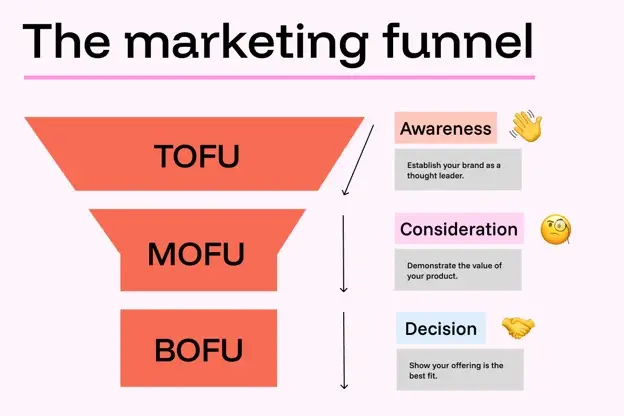
Most people tend to find themselves punching at their ad dashboard screen. Mainly when they’re noticing low Return on Ad Spend (ROAS) on their Top of Funnel (TOF) campaigns. To be completely honest, they’re not alone as we’re all sure we’ve been there before. It’s a common situation: TOF campaigns underperform in terms of the immediate revenue attributed with paid ads, and most people think, “Why should I even spend?”
Well, the truth is that turning off TOF ads can be the worst mistake you make as a marketer or paid advertiser.
The Funnel Framework
Top of the Funnel (TOF): This is where people are introduced to your brand. They don’t know you yet, so naturally, conversion rates are low, and ROAS isn’t impressive.
Middle of the Funnel (MOF): Here, people are warming up. They’re learning more about your brand, exploring your offerings, and starting to consider making a purchase. ROAS improves because these audiences are closer to making a decision.
Bottom of the Funnel (BOF): By this stage, your audience has seen your ads multiple times. They’ve engaged, researched, and now they’re ready to buy. ROAS peaks here because these campaigns are laser-focused on driving conversions.
Where Most Marketers Go Wrong
Seeing low ROAS in TOF campaigns, many marketers assume they’re ineffective and switch them off. It’s an understandable but flawed move. Why? Because TOF campaigns are the real MVPs of your funnel. They drive the traffic that eventually converts in MOF and BOF campaigns. Without them, your funnel collapses.
The Role of TOF Campaigns in the Bigger Picture
Marketing attribution often fails to give TOF campaigns the credit they deserve. It’s like a team sport: TOF sets up the play, MOF moves the ball downfield, and BOF scores the goal. If you only focus on who scored, you’re missing the brilliance of the setup.
TOF campaigns:
- Build awareness: They’re the first touchpoint for your audience. Without them, no one moves further down the funnel.
- Prime the audience: TOF ads introduce your brand and create familiarity. By the time audiences reach MOF, they’re more likely to engage.
- Support the funnel’s ecosystem: Each stage of the funnel relies on the stage before it. If TOF stops, the entire system falters.
Why You Shouldn’t Judge TOF by ROAS Alone
ROAS at the TOF stage isn’t meant to be high. The goal here is traffic, awareness, and priming—not immediate conversions. A healthy funnel sees ROAS increase progressively as people move from TOF to MOF to BOF.
Instead of judging TOF campaigns by ROAS, measure them by:
- Impressions and reach
- Engagement metrics (likes, shares, comments)
- Website traffic
- Click-through rates (CTR)
These metrics tell you how well your TOF campaigns are building the foundation for your funnel.
Takeaways
TOF, MOF, and BOF campaigns work best as a unified system. When you switch off TOF campaigns, you’re cutting off the very source of traffic that fuels your MOF and BOF efforts. To achieve long-term success, embrace the role of TOF campaigns and give them the credit they deserve.
Moral of the story: Don’t judge TOF campaigns by ROAS alone. They’re the unsung heroes that make the rest of your funnel work.

